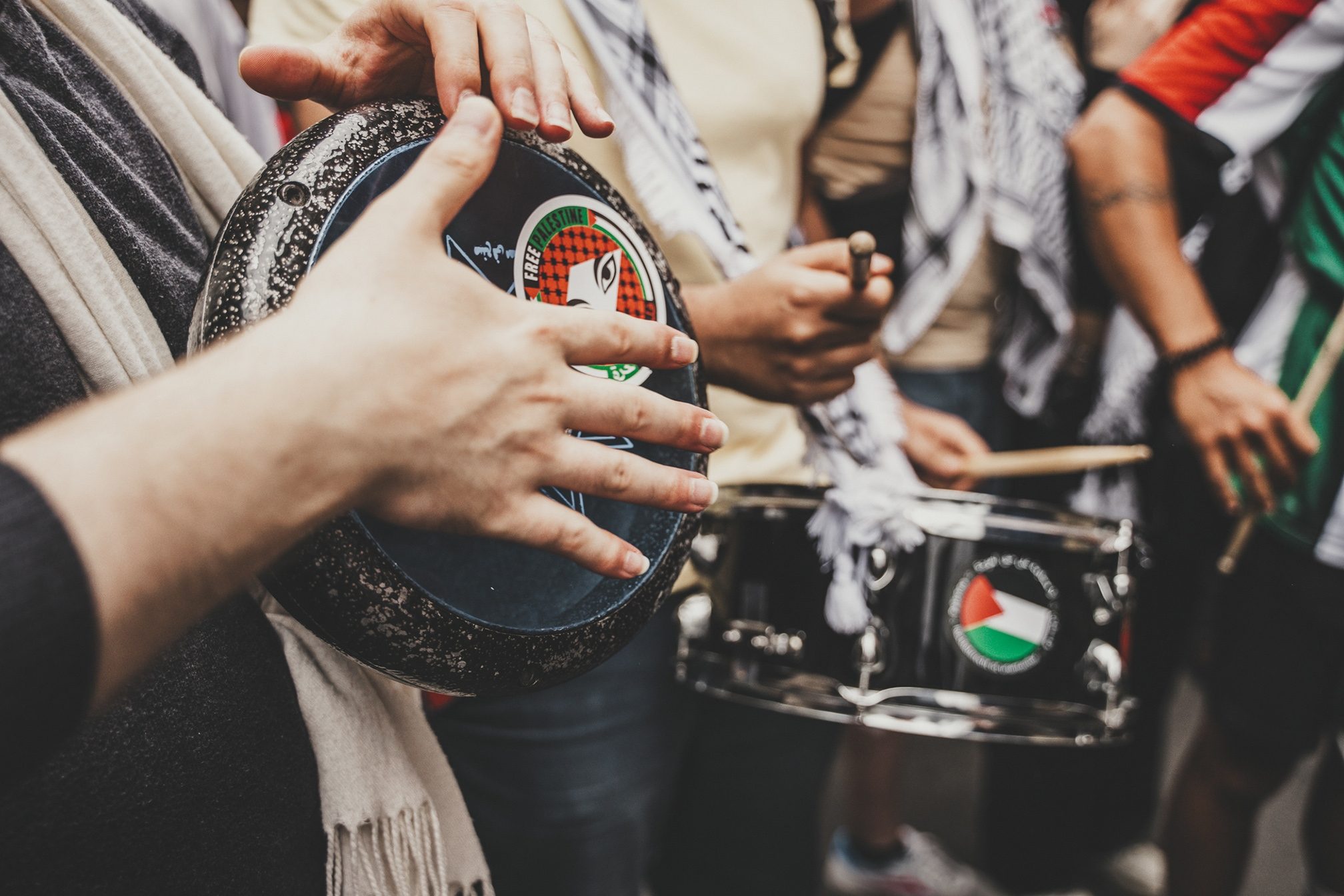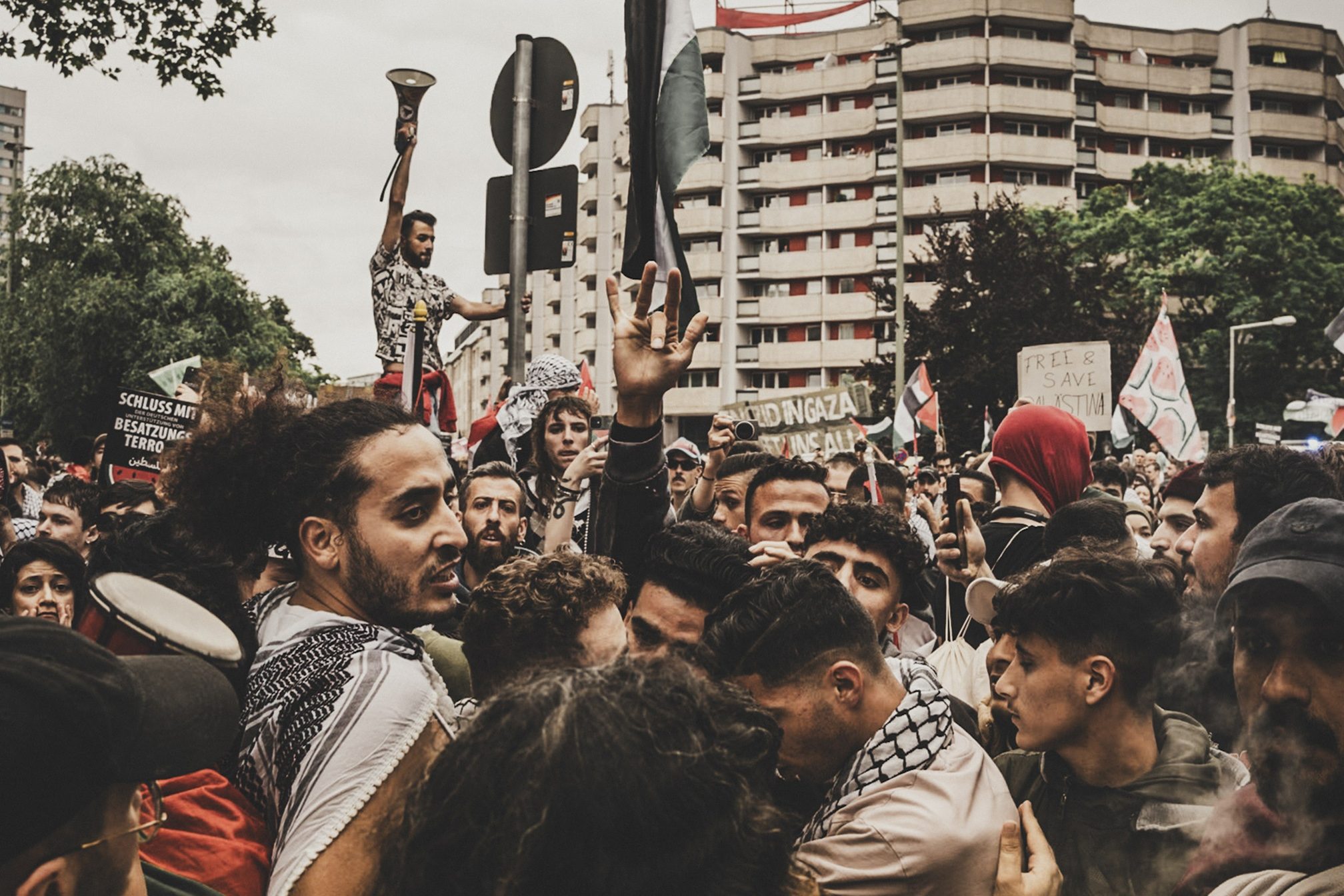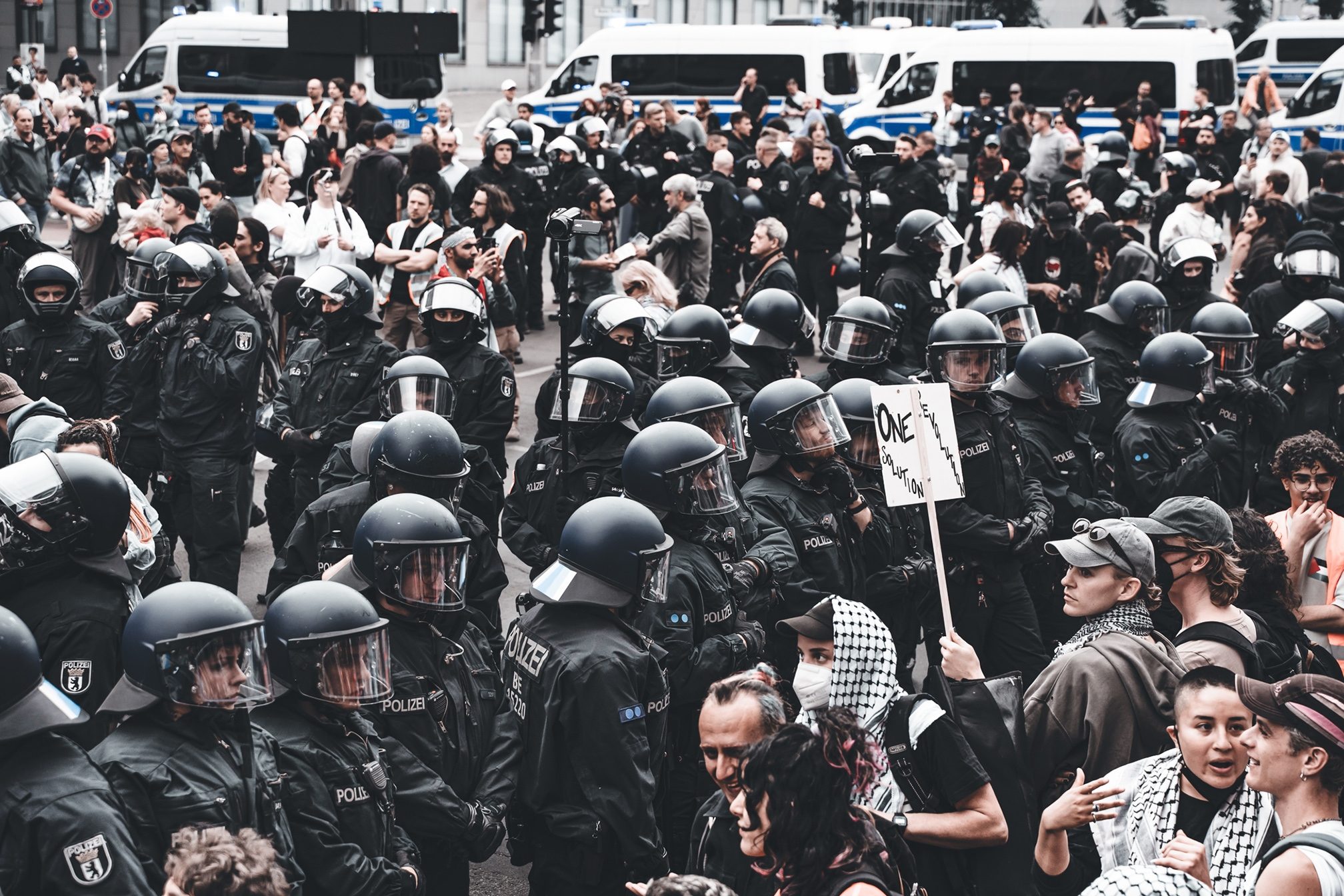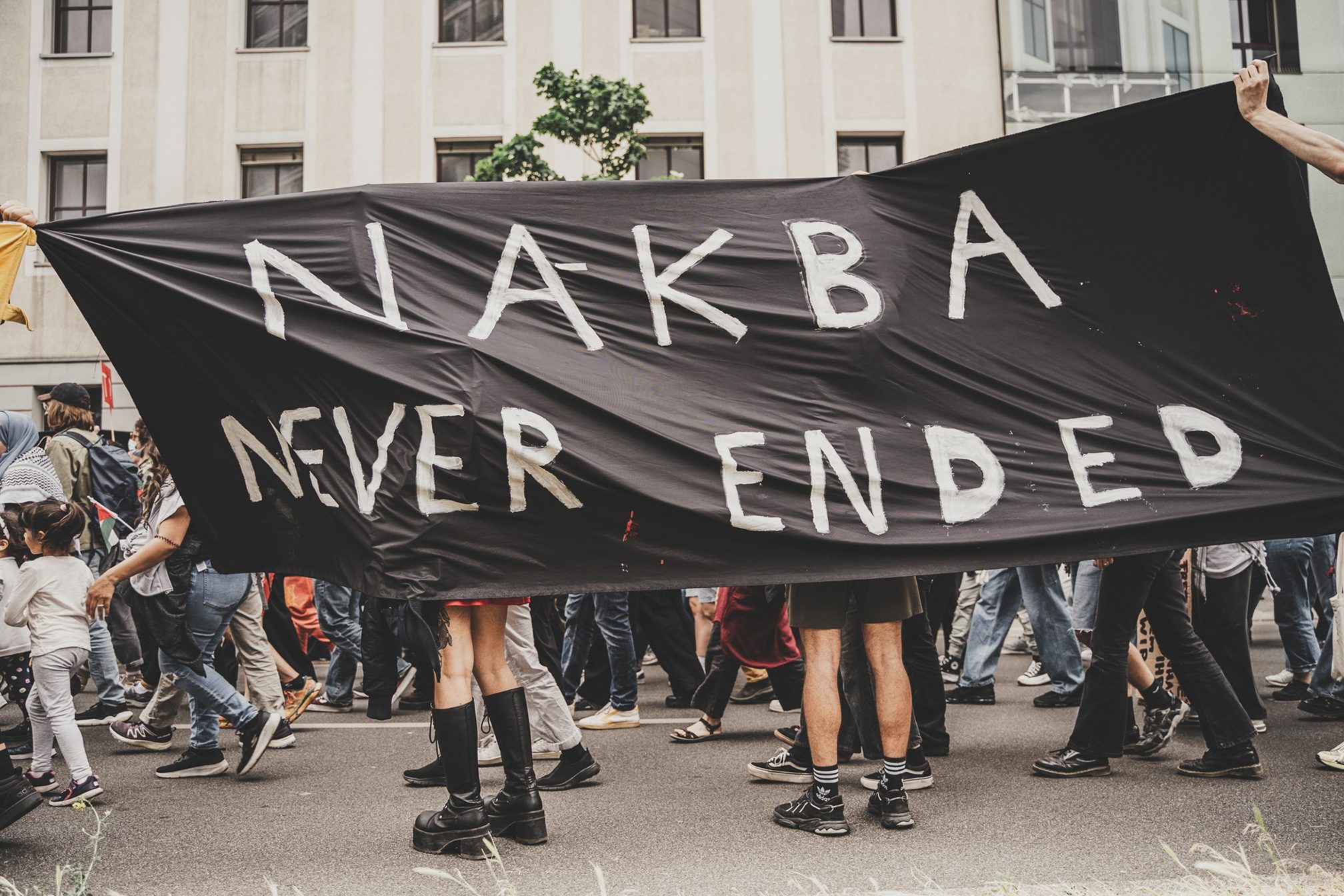 Features
Features
Stifled voices of Berlin’s creative community are still rising for Palestine
Cultural workers in Berlin face censorship, cancelled gigs and lost arts funding for showing solidarity with Palestine. Nadia Says reports
While for many Westerners Palestine is synonymous with far-away sorrowful news, in Germany and specifically Berlin, it is an every-day struggle for the Palestinian diaspora and more generally for SWANA immigrants, refugees, and expats, and also for Palestinian allies. The struggle of systemic racism and microaggressions, the struggle of not having equal access to work, education, housing, and healthcare, and the growing struggle of discrimination in the cultural field seem to have become a new norm.
We cultural workers in Berlin have a high proportion of queer folks and feminists among our midst, and our local music scene is very connected to the South-West Asia / Northern Africa region because so many artists from Iran, Lebanon, Syria, and other countries from the region, have joined our ranks looking for a land of affordable rent, cultural funding, and artistic freedom. Add to this that our schedules – although super packed – are more flexible than the usual 9 to 5, so it is often more feasible to join demos than workers from other sectors, plus we have extra personal sensitivity and platforms to express our opinions that many others do not, hence ignoring this issue in our scene is simply impossible.

Most artists in this article rarely meet without talking about this issue, and often have to comfort each other, while remembering our own situations are nothing compared to those living and still trying to make music under constant threats. Many of us in Berlin have lost work opportunities, faced silencing, and had to play diplomat instead of just playing music. As a very small example in a sea of others, I recently had to navigate curating a live show featuring Israeli and Arab artists who were happy to play together, but worried about how their respective governments might react if the event promotion reached a bigger audience.
Palestinian multi-instrumentalist and electronic producer Brikks manages to perform and advocate with other musicians publicly, so far with few restrictions; nonetheless, he struggles with the ongoing gaslighting in progressive areas of Berlin such as Neukölln, “Recently as I walked my half-German son to his kindergarten, I found a sign celebrating diversity by bearing all flags of its pupils and saying ‘welcome’ in each respective language. It was very disturbing for me to then recall scenes of teachers snatching pupils’ Palestinian flags away just last October.”

Another ambient composer from the SWANA region, who asked to speak anonymously, explains, “I was sold the Berlin dream as an artist. I came as a foreigner hoping to find refuge and grow within my practice. Instead I have been living a trauma that isn’t even mine to begin with. I face daily discrimination in public transport, I receive calls from the bank questioning my income, I have lost countless opportunities for disagreeing with unacceptable political stances, I have had to take jobs I usually wouldn’t just to get by; I even had to keep myself anonymous in a few events where I performed to avoid trouble."
Jordanian-Adige musician and composer Zazuka comments, “Most normalisers are privately in agreement that the cultural silencing is unfair. But they will not risk making public statements. These artists and cultural workers just don't want to give up everything they’ve worked so hard for. They have sunk into a state of complicity resulting from a mixture of fear of the governing politicians and comfort in the status quo.” She continues, “There are still others who are actively complicit and unabashedly supportive of the military offensive in Gaza, but even they have started to soften their stance. Still, none of the actions taken have benefited the Arab/Muslim artists previously harmed.”

Nicky Böhm from the music grassroots community Refuge Worldwide goes deeper in the mechanisms at play: “The systematic silencing and criminalisation of the Palestinian solidarity movement has triggered a tectonic shift in Berlin’s cultural landscape. Compounded by the rise of the extreme right-wing, the normalisation of anti-Arab/Muslim racism and egregious police brutality, many international cultural actors question the viability of working in Germany. While creative freedom used to be Berlin’s international calling card, curatorial practices and community organising are now shrouded in censorship and stifled by legal ramifications. Within cultural spaces, there’s an ostrich mentality, while those who dare to question Germany’s Staatsräson try to navigate the chilling effect that the government’s increasingly draconian policies have on their artistic practice and ability to get funding. It’s a moral and economic tightrope with seemingly no end in sight.”
To give some context, Germany has perpetuated genocide on several peoples including Herero and Nama people in South-Western Africa, and Jews and Roma during the Holocaust in Europe, and has aided other ethnic cleansings in recent history, currently against the Palestinian people, as defined by the UN, by providing key political support and as the second-biggest weapon supplier to Israel. Anti-Arab/Muslim/Palestinian racism, anti-Black racism, and anti-Semitism are neither new nor imported but recycled habits the cultural scene could help break, if only the system would let us.
News of artists, such as techno DJ Arabian Panther or queer rapper Mykki Blanco having gigs cancelled, and public funding being lost, have been prominent in Berlin lately. The best-known example is community art space Oyoun that saw its funding cut from one day to the next after hosting a Jewish and Palestinian vigil last November, putting over 30 marginalised folks out of work.

Seasoned Berlin native selector Femalemacho recounts some of the city’s stories. “The first time I really became aware of the occupation was about 15 years ago. My friend Eva, who is also German and was back then an internationally touring DJ, had a gig in Tel Aviv where she met not only partygoers, but also activists fighting for the Palestinian people. She quit her career and decided to stay in Tel Aviv as an activist. She passed checkpoints and witnessed the inhumane conditions in Gaza and the West Bank. She then returned to Berlin and told everyone who would listen about the Nakba and the ongoing violence against the Palestinian people.”
She continues, “In 2021, I spoke to an Israeli contemporary artist living in Berlin who signed the BDS manifesto. She told me that her participation in a local exhibition was questioned because her art seemed to be anti-Israel. Now she lives in London because she can no longer find work in Berlin. Political parties in Germany, from right to left, stand behind Israel and the ongoing violence. This is why I attend as many demonstrations as possible despite friends calling me anti-Semitic on social media. After seeing the brutality of the Israeli army, it made no sense for me to play music and have fun; I was shocked by the silence in the club scene - a movement supposedly standing for freedom. So I changed my focus and found collectives and parties in Berlin that support and fundraise for Palestine. Only in this context, I find it possible to play music and dance again.”

Experimental performer and producer Mad Kate tells us about their own take on the role of music and demonstrations, “I started experimenting and working as a musician and physical, explicit body in performance in 2002 in San Francisco and 2004 in Berlin. For me the question of where and how to place my white, American, middle-class body, in order to make an impact and effect change, was always the driving question. For many years I felt that performing in Europe on political stages was ‘enough’. But the silencing of pro-Palestinian voices has grown so extreme that it is clear my body must be in the streets. This is where the physical performance needs to take place, standing up, being out about our beliefs, shouting, and standing witness. Chanting together is just another type of making music. Standing arm-in-arm in protest is just another form of dance.”
Challenges do not come from the inside only though, Berlin is also faced with cancellations from foreign artists who refuse to partake in the genocide normalisation perpetuated by many institutions and festivals who accept questionable compromises to obtain public funding. The Boycott, Divestment and Sanctions and Strike Germany – both movements aiming to call out cultural events white-washing the Israeli government - have led some of these actions that are morally justified but also isolate Berlin artists further. Juliana Fadil-Luchkiw, a UC Berkeley PhD Candidate, explains hers and Lena Chen’s decision, “We withdrew from With Legs Wide Open: A Whore's Ride through History in support of Strike Germany. We took part in this strike because it targets German state funding that directly supports the genocide of Palestinians in Gaza. The curation of the show took a feminist and queer lens to discuss sex work history, which is intrinsically intersectional. If feminism is not intersectional, it upholds global white supremacy. How can we begin to discuss any kind of feminist liberation if women in Palestine are experiencing unimaginable violence by the Zionist government? The genocide of Palestinians is inseparable from feminist issues.”
Electronic rock band The Psychotic Monks, who tirelessly speak up for Palestinian liberation, trans* rights, and against the extreme right wing in their native France, made a different choice, they decided to tour in Germany and openly talk about Palestine on stage: “We asked ourselves if we weren't going to get cancelled [...], for us it's all good as long as we're not prevented from playing and from conveying ideas.”

Ahmed Eid, a Berlin-based Palestinian musician who plays in several outfits including the band Bukahara, is baffled by how many Palestinians and allies have been systematically silenced, cancelled, and criminalised, and how “even our anti-Zionist Jewish friends have been called anti-Semite by white Germans when standing for a free Palestine”. Ahmed regularly speaks up on stage in spite of hecklers and silencing by promoters and explains, “It is important to spread the message, and this is why I decided to go to Fusion - who had made two shameful comments about the Palestinian liberation, and reclaim the space. I gave a music workshop in Cairo for kids who had just arrived from Gaza, and I asked them if I should boycott the festival or use the platform to share their message with the audience, and they helped me choose. Each situation is different, it is essential to evaluate what will have the most impact. Sometimes a boycott will be the most impactful, but it is important not to cancel each other out and instead support each other because there are different ways to manoeuvre this struggle.”
Many wonder why cultural workers generally, and especially musicians, feel we must stand in solidarity with Palestine even when it means losing our job and sometimes our safety. Many of us hope that our beliefs in intersectional humane values, the influx of foreign talent, and the eye of the international public opinion will help Berlin and Germany out of their racist habits. We cannot keep business as usual and accept to be silenced on such an important issue for us, for the people of Palestine and all others suffering under colonisation, and for the beating heart of humankind - which is what music is all about.
Nadia Says is the founder of Your Mom's Agency, follow her on Twitter
Faisal Yassin is a Street & Portrait Photographer, check out Faisal's website and Instagram


